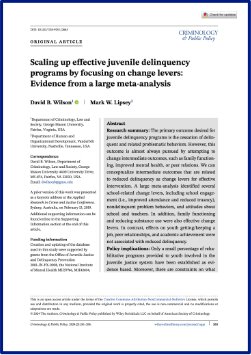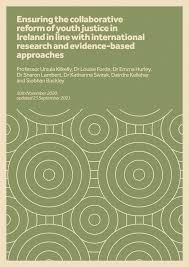By David B. Wilson, Mark W. Lipsey
Research summary
The primary outcome desired for juvenile delinquency programs is the cessation of delinquent and related problematic behaviors. However, this outcome is almost always pursued by attempting to change intermediate outcomes, such as family functioning, improved mental health, or peer relations. We can conceptualize intermediate outcomes that are related to reduced delinquency as change levers for effective intervention. A large meta-analysis identified several school-related change levers, including school engagement (i.e., improved attendance and reduced truancy), nondelinquent problem behaviors, and attitudes about school and teachers. In addition, family functioning and reducing substance use were also effective change levers. In contrast, effects on youth getting/keeping a job, peer relationships, and academic achievement were not associated with reduced delinquency.
Policy implications
Only a small percentage of rehabilitative programs provided to youth involved in the juvenile justice system have been established as evidence based. Moreover, there are constraints on what local policy makers and practitioners can do regarding the selection, adoption, and implementation of programs from the available lists of evidence-based programs. Adopting programs that focus on effective change levers and avoiding those that concentrate on ineffective ones has the potential to increase the likelihood that a local agency is engaged in effective programming. Based on our data, programs known to improve family functioning, attachment to and involvement in schooling, and reducing substance use are justified by the change lever evidence, even if these programs’ effectiveness in reducing delinquency has not been directly proven. In contrast, programs focusing on vocational skills, academic achievement, and peer relations are less likely to be beneficial. Furthermore, a change lever perspective can help frontline staff select appropriate programs for different juvenile offenders and focus their quality control efforts on those aspects of a program that are likely to be essential to maintaining effectiveness.
Criminology & Public Policy Volume23, Issue2. May 2024.



